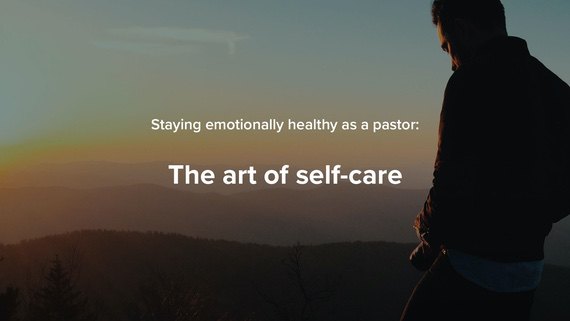While this year has been undoubtedly challenging for everyone, it has been brutal for pastors. They’ve had to lead their congregations through massive and sudden change without warning or a roadmap.
They have to make the best decisions they can. Whatever they decide, they can be rest assured that even their leadership and congregations are guaranteed to have a large percentage that will not agree with their decisions — often with a great deal of emotion and sometimes even anger.
Pastors are weary. They have decision fatigue. They’re emotionally exhausted, and some are burning out. That’s why we started this series of videos this summer. They are geared toward the emotional health of the pastor. Each week, I will interview a pastor with great practical wisdom and guidance to offer you.
This week, it is my great honor to introduce to you the vice president of National Ministries for Converge and senior pastor of New Beginnings Church. He is Dr. Michael Henderson. He has been an incredible blessing in my life, and I think you’re going to get a lot out of this time.
Bruce Hopler: So, Dr. Henderson, welcome. Have you been seeing this in your own context?
Michael Henderson: Thank you, first of all, Dr. Bruce, for doing this. And I do want to say as a part of our strengthening team, you have championed this cause for so, so many years, and absolutely, Dr. Bruce, I have seen exactly what you’re saying.
First of all, I don’t think we need to underplay what we’re facing in the pandemic and the social unrest and churches and pastors. We’re seeing something that we’ve never seen. And so I really believe that, I call it this, we are living in a perpetual state of crises because the numbers of persons who have been impacted, infected and are dying are record numbers and they’re increasing every day.
Pastors, of course, as people who are called to care for people, many of our flock, many people that we know, we come in contact with, we are expected to show care and show empathy and to show sensitivity, but at the same time, we’ve got our own challenges, Dr. Bruce, that we’re having to deal with.
And so we’re expected to be on the one hand, helpful, which we should be, but on the other hand, we’re human, and a part of our humanity is that we’ve got some feelings about what’s going on and what do we do with that?
So, yes, absolutely to your question, I am seeing this impacting pastors all across our nation.
BH: You know, Dr. Henderson, the aspect of mental health and taking care of believers and even pastors, this is not a new topic for you. There’s a reason why you championed it in Converge for many years now, because you have championed it in your own life and you have championed it within your own ministry. Could you share with us a little bit about that?
MH: Well, first of all, I’m a trained pastoral counselor, OK, and so I have learned through the years to appreciate mental, emotional and spiritual health for pastors or for the body of Christ, I should say.
One of the things that I think is important, Dr. Bruce, that we understand, pastors are people too, and we have, particularly leaders, to understand that we bleed, we hurt, we go through disappointment, we go through heartache and early on in my ministry, I just, frankly, I found myself just being kind of robotic and methodical in going about ministry and not caring about or taking time for my own mental, emotional and spiritual health and I burnt out.
And I really developed a theology and a philosophy of health. It reminds me of this, Dr. Bruce, anytime you’re on a flight, the attendant will come on and say, “Hey, if we hit turbulence and we begin to lose oxygen in the cabin, listen, there will be oxygen masks that drop.”
But the one thing that really struck me, and I thought long and hard about this; they often say, “If you’re traveling with someone else, put your mask on first.” Which is to say, you can’t help anyone else if you’re susceptible to what’s going on, and you may not realize it, but as leaders in the body of Christ, as people in the body of Christ right now, we are in an emergency and we’ve gotta put our mental health, spiritual health and emotional health mask on first.
BH: So Dr. Henderson, the target focus group of these particular videos are pastors. What would you say in general about the necessity of maintaining their own mental health, and how has this season of this pandemic heightened the necessity of a pastor focusing on emotional, spiritual and mental wellbeing?
MH: Well, first of all, I totally agree that pastors, as I just stated, we’ve gotta take care of ourselves first, and I think sometimes we, because we’re in the helping profession, often will look to serve others and really, as I’ve went through earlier on in my ministry, not thinking about or really intentionally looking to take care of ourselves.
And so, let me just say, statistically right now, the Barna Group has put out some research that discovered that pastors right now are filling more and more stress, more and more strain, are feeling less and less encouraged and depression amongst pastors right now is up significantly.
We’re talking about anxiety. I think all of us are feeling that, but pastors, some of us don’t know, Am I gonna have a church? And some of us that are still fighting with this pandemic. And so all of those things are real, and it will lend itself if you’re not careful to you wanting to be constantly trying to swim upstream or make this thing happen.
And I found myself even early on, Dr. Bruce, honestly, and I understand mental and emotional and spiritual health, but when the COVID-19 really hit us, it was just so sudden, you just saw these numbers, and I just felt like I was just getting caught up in it.
I had to remind myself of what Peter Scazzero talks about in his book The Emotionally Healthy Leader, is that my emotional health, my spiritual health, my mental health is so important that if I’m not intentional about putting safeguards in place for myself, I’m not gonna be much help to anyone else.
So I immediately start doing that. I have times during the day, Dr. Bruce, that I shut things down. I say, “That’s enough. I’ve accomplished as much as I’m gonna accomplish today.” Even though I’m working from home, which I often do, but at a certain time, I say, “That’s it. The rest of this time I’m gonna spend on me or my family.”
I’m not going to let my days run together because I am constantly putting out fires or constantly in a state of anxiety, which is never good for your mental, emotional or spiritual health or physical health, as you know. And so what has helped me through the years, is what I’ve tried to get pastors to do, is as Henry Cloud says in his book on boundaries, “You have to be able to say no so that you can say yes to you.”
Sometimes for pastors, that’s the hardest thing for us to do, Dr. Bruce, is to say no to ministry, so that I can say yes to the things that I need in order to keep my myself in a healthy place.
BH: Wow, that’s really powerful, and it is so, so necessary. So we have pastors who’ve suddenly had this massive learning curve of how to do church differently. They’re having to make decision after decision after decision. Sometimes any decision they make is upset by the news the next day, and so they’re having decision fatigue. They’ve been running hard, and now their congregation is not always pleased with their decisions. What would be some real, practical advice as they’re going on this uncharted territory to have emotional, mental and spiritual health during the season?
MH: Well, listen, every pastor knows this, but let me just kind of reemphasize this. I think in the morning, we have to take time with God. There has to be a consistent time, Bruce, before we hit our stride for the day that we just calm our spirit, get in his presence — it doesn’t have to be a long, extended period of time — and really connect with him.
Because I think that the one calming thing for me and I just believe that as a pastor, a leader, one of the calming things I think is knowing that, everything I do, I wanna do it for him. So whatever you do in word or deed, do it unto the Lord and not unto man.
So before I try to interact with anything or anyone, I wanna make sure that I’ve connected with him, I’ve gotten his approval, I’ve affirmed our relationship, and I feel a sense of purpose for that day. That’s critical because I’m gonna run into some things that day that are gonna shake me, decisions that I have to make that are going cause some anxiety and tension.
And I’ve gotta have a foundation where I’m being led by him and as I am leading, I’m confident that there’s a pathway that I’m headed toward that he has guided me on. So I would say every day, spend time in his presence, make sure that you have connected with him.
Now the broader secular world is getting this because you really see things now being taught like time alone meditation times they’re calling it. There’s a sense of self that comes when you spend time alone and, in our case, with pastors, time alone with God.
It’s just a refreshing and renewing that takes place. Now I know, and again all pastors know this, but sometimes we forget it, Dr. Bruce, because there’s so many demands on our time that we forget the basics and that’s just spending time in his presence. I would say that’s number one.
Then I would say, make sure that you’re spending time with your family through the day. It’s critical, as Henry Cloud says, that we set boundaries, that we have family time. My wife and I, we decided at least three times a week, at certain times, we would stop during our day — because we both are in ministry — and just check in.
I mean, the people who love you and know you, can often see things going on with you that you may not even be aware of, and if you’re having regular check-in times with those persons, then it’s good for you, but it is also good for them. It’s what God has put in our lives. Family is a real benefit for those of us who do have family, that’s a great, great thing to do on a regular basis as well.
I would say a third thing, Dr. Bruce, that I would encourage pastors to do, is start with a list of things that you wanna get accomplished that day because let me tell you something, we’re in a season, I call it a perpetual crisis again, where things are coming at us so fast, we’re facing things we’ve never faced before, and we’ve got all these demands.
I would say, get a reasonable list of things that you wanna accomplish for that day and try to work through that. Give yourself some flexibility. So you know that you’re not gonna be able to accomplish 25 things in one day, that’s unrealistic, right?
But there are three to five things, assignments, if you will, that you would be able to accomplish, do that and then close the books so to speak on that day and say, Hey, I feel like I’ve been productive because I’ve accomplished the things that I really believe are the, not necessarily the most pressing things, those aren’t always the best things, but the things that you really feel you need to accomplish to move your ministry forward and to move your life forward. I would say three to five things, and then close the book on that day and know that you’ll be able to pick up a list the next day.
Give yourself permission also to make midcourse corrections. A lot of pastors are feeling anxiety because we’re saying, “I got all this stuff to do and I don’t have enough day and enough hours in the day to get it done.”
Well, if you’re segmenting all of those things out and say, “Hey, I can only accomplish so much in one day,” and you’re giving yourself permission to do that, then you’re taking away a lot of the anxiety that you would feel for not getting all of those things and particularly those pressing things that are often are not necessarily the most necessary things that you haven’t accomplished.
So, listen, give yourself permission to say, “I’ve done what I feel like I need to do in this day,” close the book on that day and then exhale and thank God for what he has allowed you to get accomplished.
BH: You know, Dr. Henderson, you began this final question saying: “Well, I know a lot of pastors know some of this.” Isn’t it amazing that when we are in what you call the perpetual crisis, how we will have a tendency to get so information-based — what’s new? What’s new? What can I learn? What’s new? What’s new? — that we forget the very deep down things that we already know that are true, that make us healthy.
And each of the things you listed, who knows, maybe a pastor said, “I knew that, I knew that, I knew that,” but are you doing that? And during this season, we need a fresh word from God, a fresh reminder, that we have got to spend time with him, and we have got to spend time alone with our families and with others, and we’ve got to just say, “What are our priorities. What can I do? What can’t I do?” And leave it at that and be at peace with that, rather than trying to play God and acting like we can get it all done.
MH: Amen, I couldn’t have said it better. Your recap is better than what I said, Dr. Bruce. But I do think Dr. Tony Evans mentioned something years ago, he had a phrase he would call theo ego, and that’s a god complex. And a lot of pastors we have that, we don’t mean to have that, but it’s like, if I don’t do this, then it’s gonna fall apart.
Listen, these are God’s people, it’s God’s church, it’s God’s agenda, and he doesn’t tell us that we have to get it all done. We’ve got to do our part, don’t get me wrong, but at the end of the day, Colossians says, “In Jesus Christ, all things are held together.”
So Jesus is going to hold his church together, he’s gonna hold our lives together, he’s gonna hold our assignments together if we just trust him to do what he promised that he would do.
BH: Yes. Well, Dr. Henderson, I’ve decided I wanna end this way. Would you pray for the pastors that are listening, and we’ll close our segment with your prayer?
MH: Absolutely, it’s my honor.
Father, I thank you for Dr. Bruce, and I thank you for each pastor that may view this or watch this podcast. God, my prayer is for our mental, emotional, spiritual and our physical health. We didn’t even talk about daily exercise and that’s so important. So Father help us, those of us who are struggling, we all have had hard times, refresh us, renew us with a renewed mind every single day. And God for those pastors who find themselves in a deep hole of depression or an outlook that is hopeless, I pray God that you would allow them to connect with you and others who will help them through this time.
Our prayer is that this perpetual state of crisis will not destroy your people, particularly your leaders, your pastors, that we would find this time to really rediscover you in a new and fresh way and rediscover your purpose for our life in a new and fresh way. Thank you for Dr. Bruce and thank you for the pastors. Thank you for our assignments and we ask your will be done in thy name, amen.
If you’re a pastor and you need somebody to talk to, contact us.



